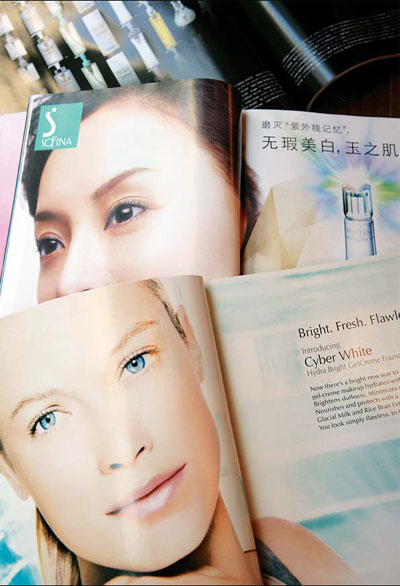Business
Magazines seek new revenues
Updated: 2011-05-16 08:01
By Karen Yip (China Daily)
|
The China edition of Vogue and Elle magazines feature advertisements for whitening skin products. Matthieu Paley / Bloomberg |
More China-foreign partnerships predicted by industry observers
BEIJING - Consolidation in China's publishing industry, stemming from a gradual reduction in funding by the central government, will encourage more licensing partnerships between foreign-owned magazines and Chinese media houses.
Doreen Chan, managing director, Asia Pacific, BPA Worldwide, a media audit firm, told China Daily that such partnerships will be an ongoing trend in China and have proven to be a win-win strategy for both foreign and Chinese publishers.
While foreign publishers benefit from their Chinese partners' local knowledge and the license to print, "Chinese publishers could stand to gain from their foreign counterparts' experience in marketing, operations and how to run and manage a commercial entity", she said.
Surrounding this trend is the undeniable healthy appetite among Chinese readers for glossy magazines and a rapidly changing social demographic in which more Chinese now have the financial strength to acquire products and services that used to be unattainable.
"In the past eight years, the Chinese government has gradually reduced funding to local publishers and this has forced many of them to start operating from a commercial perspective in order to keep their publishing companies alive," said Chan.
Historically, Chinese publishers have depended on government funding to run their operations. It is estimated that China today has 9,000 magazine titles and 2,000 newspaper titles, excluding foreign publications.
In the past, foreign publishers who were interested in printing for the Chinese mainland market found it difficult to secure regulatory approval for publication licenses.
This has forced foreign publishers to print from offshore locations such as Hong Kong or Singapore.
But it has proved to be an expensive affair as these publishers had to factor administrative and shipping costs, which translates to higher retail prices for their magazines when sold in China.
To bypass the difficult and often lengthy process of securing regulatory approval for new publications, some Chinese media companies have launched new magazine titles using a license from older titles.
One famous casualty was the Chinese edition of Rolling Stone. Regulators shut it down after its first issue in March 2006.
The General Administration of Press and Publication (GAPP), which regulates the media industry, said the magazine - published by State-owned China Record Corp and One Media Group of Hong Kong with content licensed from Wenner Media - didn't have proper official approval.
"Both the Chinese and foreign publishers will have to find their own way to address their problems. I expect to see more partnerships between the Chinese and foreigners," Chan said.
Thanks to the evolution of the Internet, publishers can now tap into the online market.
Without a local partner, Chan foresees an uphill climb for foreign publishers in China.
"Through partnerships, foreign publishers could understand better the local market conditions and to learn where is the right direction," said Chan.
"If they don't, it'll be a long way and challenging for foreign publishers to succeed in China."
China Daily
Specials

The song dynasty
There are MORE THAN 300 types of Chinese operas but two POPULAR varieties are major standouts

Sino-US Dialogue
China and the US hold the third round of the Strategic and Economic Dialogue from May 9-10 in Washington.

Building communities
American architect John Portman and his company have developed more than 30 projects across China.
